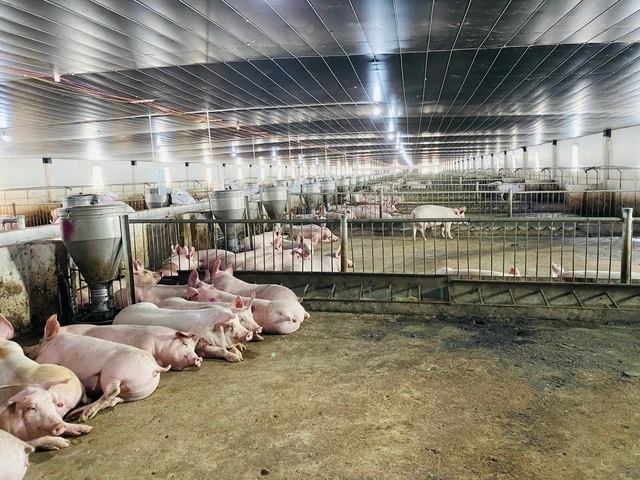 Economy
Economy


|
| A Hoang Anh Gia Lai JSC's swine farm—Photo cafef.vn |
HÀ NỘI — Increase of domestic raw materials for animal feed is considered essential for sustainable development, and a number of instructions have been put in place to support relevant manufacturers and businesses.
The scale of Việt Nam's livestock industry has multiplied in recent years, however, the animal feed market remains significantly dependent on imported raw materials. Increasing domestic raw material sources is considered a fundamental solution to achieving sustainable and stable development.
Domestic material supply is heavily deficient
Việt Nam has spent huge budget resources to import animal feed ingredients such as corn, soybean and wheat to serve domestic production.
The Ministry of Agriculture and Rural Development estimated that the country imported approximately 10.5 million tonnes of animal feed and raw materials worth US$5.1 billion this year, while exports were only around $1.2 billion. Thus, the trade deficit in the animal feed sector would amount to $3.9 billion.
The livestock industry consumes over 33 million tonnes of feed annually, mostly for the production of poultry and pigs. Việt Nam needs a significant amount of refined feed ingredients to meet this need, but it can only produce roughly 35 per cent of the total, or 13 million tonnes, annually, and the remaining portion is imported.
Masan Group, which accounts for 6 per cent of the country's animal feed output, has sold the entire animal feed segment to De Heus Company (the Netherlands), which negatively impacted Việt Nam’s supply.
The number of products and by-products from the processing of seafood, cattle and poultry that are utilised as animal feed is not high. Việt Nam can only manufacture a limited amount of mineral supplements, microbiological products and herbs, and it lacks production equipment, therefore, up to 80 per cent of the country's needs are imported.
Increase domestic production capacity
The Việt Nam Poultry Association forecasted that Việt Nam's demand for feed raw materials would reach about 28 to 30 million tonnes per year in the next five years, worth $12 to 13 billion USD, with an average growth rate of 11 to 12 per cent annually.
Việt Nam has to strive to improve independence in raw material sources for the production of animal feed to mitigate supply concerns and ensure sustainable development.
On December 15, Deputy Prime Minister Trần Lưu Quang signed a decision approving the project to develop the animal feed processing industry until 2030.
The project encourages the strong development of the raw material and food supplement production industries, especially using biotechnology, to meet the need for biological products to replace antibiotics and chemicals used in livestock farming and recovery.
It also calls for expanding the farmed land for intensive grass and animal feed production. The total area is expected to reach 0.5 to 1 million hectares, enhancing domestic animal feed production by growing corn and specialised crops for animal feed.
Agricultural by-products will be utilised to create supplementary feed and develop organic food products that meet biosafety quality standards.
The seaport infrastructure system as well as specialised warehouses that facilitate the import and export of animal feed and raw materials will be invested for rapid completion. — VNS